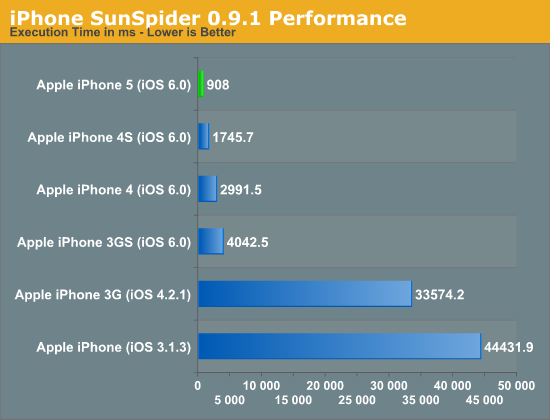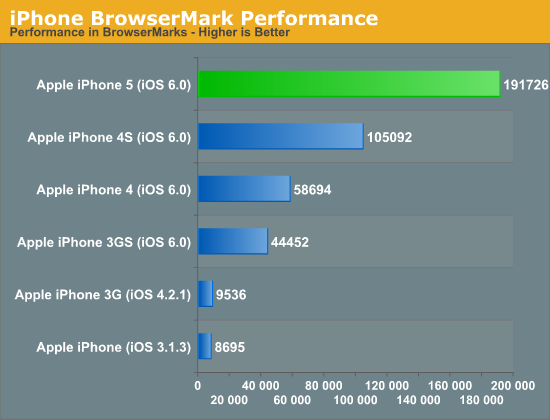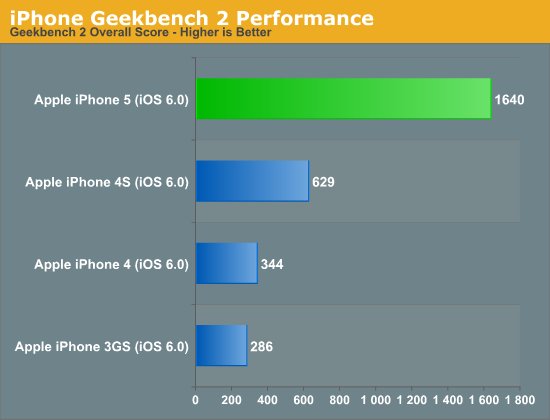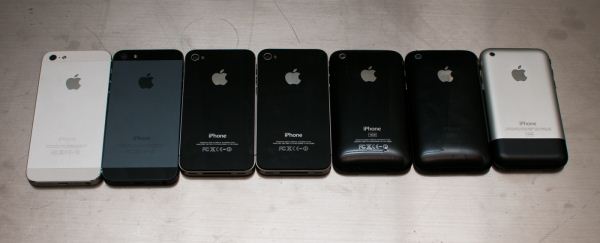The iPhone 5 Review
by Anand Lal Shimpi, Brian Klug & Vivek Gowri on October 16, 2012 11:33 AM EST- Posted in
- Smartphones
- Apple
- Mobile
- iPhone 5
Six Generations of iPhones: Performance Compared
Section by Anand Shimpi
Cross platform smartphone benchmarks are interesting, but they do come with their own sets of issues. Before we get to that analysis however, let's look at how the iPhone's performance has improved over the past six generations. Luckily Brian has a set of all of the iPhones so he was able to run a few tests on all of the devices, each running the latest supported OS.
We'll start with SunSpider 0.9.1, our trusty javascript performance test:

The transition from iPhone to iPhone 3G shows you just how much additional performance you can squeeze out of simply a software change. There's likely even more that could be squeezed out of that ARM11 platform, unfortunately newer versions of Safari/iOS aren't supported on the iPhone 3G so we're left with a runtime that's around 37x the length of a single run on the iPhone 5.
The rest of the devices support and run iOS 6, so we're at least on a level software playing field. The performance boost from one generation to the next is quite significant still. Going by this chart alone, the best balance of minimal upgrades and maximum perceived improvement would be from the original iPhone to the 3GS then again from the 3GS to the 5.

The BrowserMark results tell a similar story. The jump from the ARM11 based iPhone/iPhone 3G to the 3GS running iOS 6 is huge. Both the 4S and 5 offer doublings in performance, albeit for different reasons. The 4S delivered a doubling thanks to a doubling of core count and a move to the Cortex A9, while the iPhone 5 doubled performance through a much higher clock speed and microarchitectural improvements.
Finally we have Geekbench 2, which only runs on the iOS 6 supported devices so we say goodbye to the original iPhone and iPhone 3G:

None of the jumps looks as dramatic as the move to the iPhone 5, but we already know why. The Swift CPU architecture does a great job improving memory performance, which shows up quite nicely in a lot of the Geekbench 2 subtests.
On the PC side we often talk about 20% performance improvements from one generation to the next being significant. It's clear that the mobile SoC space is still operating along a hyper Moore's Law curve. The rate of progress will eventually slow down, but I don't see that happening for at least another couple generations. The move to ARM's Cortex A15 will be met with another increase in performance (and a similarly large set of power challenges), and whatever comes next will push smartphones into a completely new category of performance.












276 Comments
View All Comments
A5 - Tuesday, October 16, 2012 - link
He said pretty clearly and repeatedly that all browser tests on Android were run in Chrome.Rooting the phone to install a new kernel to improve benchmark scores would be insane. That's like asking why he didn't overclock it, too.
edsib1 - Tuesday, October 16, 2012 - link
But his benchmarks scores are all crap.My HTC One X (Tegra) with official 4.04 RUU gets 1684 compared to 1131 in Anands tests.
Something is seriously wrong with his testing.
It should also be pointed out Geekbench has errors. It reports memory sequential reads for android devices incorrectly.
doobydoo - Friday, October 19, 2012 - link
Dunno why you're even talking about Geekbench.Anand has noted several times that you can't use it to accurately compare cross platform.
Kidster3001 - Monday, October 22, 2012 - link
umm, you do know that for Kraken and Sunspider... lower is better.Spunjji - Friday, October 19, 2012 - link
I agree that rooting the phone and installing a new kernel for benchmarking is silly, but at least having up-to-date figures for a phone known to have received significant performance increases since its release would be a nice idea. This chap's numbers certainly make the phone look very different in terms of attractiveness.Kidster3001 - Monday, October 22, 2012 - link
I also believe you will see better browser performance from the highly customized Intel Android browser than you will from Chrome for x86 Android.Krysto - Tuesday, October 16, 2012 - link
Something seems very wrong with RAZR M. It uses the same S4 processor as One X, has smaller 4.3" screen, has lower qHD resolution, bigger battery, and yet it still significantly underperforms the S4-based One X in Sunspider performance, in battery life, and other stuff as well. That shouldn't happen, and it seems like the issue is some very sloppy software that Motorola put on top of the RAZR M hardware.Arbee - Tuesday, October 16, 2012 - link
Yes, it's called Motoblur ;-)Spunjji - Friday, October 19, 2012 - link
I thought they killed Blur already? :/magnimus1 - Tuesday, October 16, 2012 - link
Thanks! This was one phone I was waiting for. The other one I want to see is the Motorola RAZR i. Do you guys have any plans to review that?